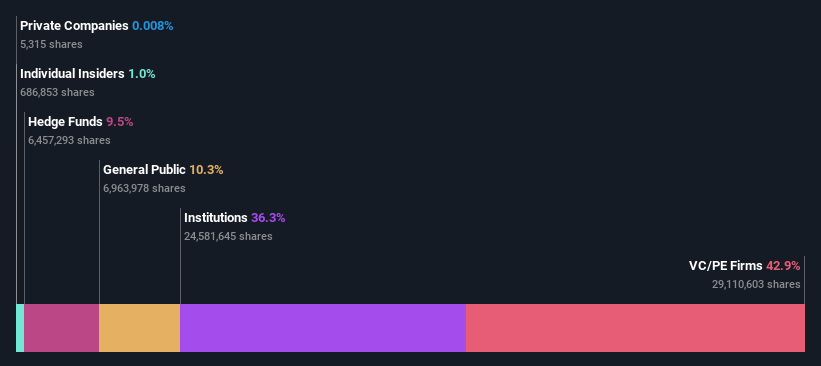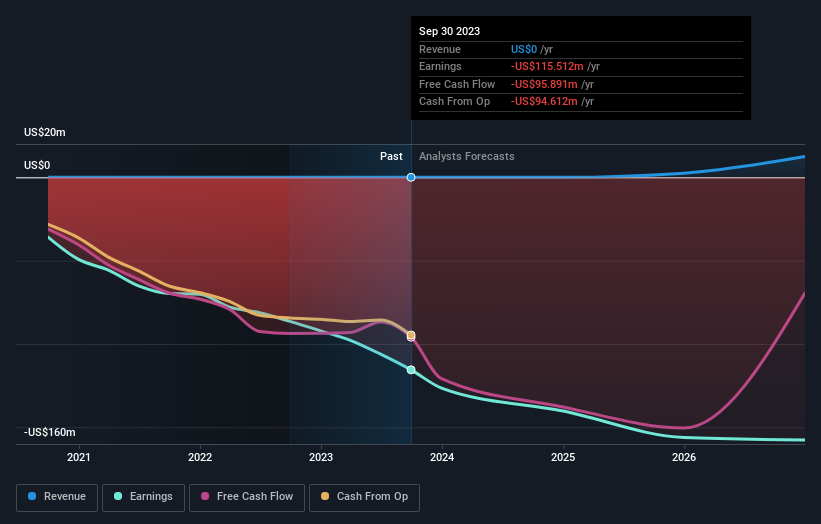Institutions own 36% of Vor Biopharma Inc. (NASDAQ:VOR) shares but private equity firms control 43% of the company
Key Insights
Vor Biopharma's significant private equity firms ownership suggests that the key decisions are influenced by shareholders from the larger public
The top 3 shareholders own 54% of the company
A look at the shareholders of Vor Biopharma Inc. (NASDAQ:VOR) can tell us which group is most powerful. The group holding the most number of shares in the company, around 43% to be precise, is private equity firms. That is, the group stands to benefit the most if the stock rises (or lose the most if there is a downturn).
Meanwhile, institutions make up 36% of the company’s shareholders. Generally speaking, as a company grows, institutions will increase their ownership. Conversely, insiders often decrease their ownership over time.
In the chart below, we zoom in on the different ownership groups of Vor Biopharma.
See our latest analysis for Vor Biopharma
What Does The Institutional Ownership Tell Us About Vor Biopharma?
Institutional investors commonly compare their own returns to the returns of a commonly followed index. So they generally do consider buying larger companies that are included in the relevant benchmark index.
Vor Biopharma already has institutions on the share registry. Indeed, they own a respectable stake in the company. This suggests some credibility amongst professional investors. But we can't rely on that fact alone since institutions make bad investments sometimes, just like everyone does. When multiple institutions own a stock, there's always a risk that they are in a 'crowded trade'. When such a trade goes wrong, multiple parties may compete to sell stock fast. This risk is higher in a company without a history of growth. You can see Vor Biopharma's historic earnings and revenue below, but keep in mind there's always more to the story.
It looks like hedge funds own 9.5% of Vor Biopharma shares. That catches my attention because hedge funds sometimes try to influence management, or bring about changes that will create near term value for shareholders. RA Capital Management, L.P. is currently the largest shareholder, with 34% of shares outstanding. In comparison, the second and third largest shareholders hold about 11% and 9.5% of the stock. In addition, we found that Robert Ang, the CEO has 0.7% of the shares allocated to their name.
After doing some more digging, we found that the top 3 shareholders collectively control more than half of the company's shares, implying that they have considerable power to influence the company's decisions.
While it makes sense to study institutional ownership data for a company, it also makes sense to study analyst sentiments to know which way the wind is blowing. There are plenty of analysts covering the stock, so it might be worth seeing what they are forecasting, too.
Insider Ownership Of Vor Biopharma
The definition of an insider can differ slightly between different countries, but members of the board of directors always count. Company management run the business, but the CEO will answer to the board, even if he or she is a member of it.
I generally consider insider ownership to be a good thing. However, on some occasions it makes it more difficult for other shareholders to hold the board accountable for decisions.
Our most recent data indicates that insiders own some shares in Vor Biopharma Inc.. In their own names, insiders own US$1.5m worth of stock in the US$144m company. Some would say this shows alignment of interests between shareholders and the board, though we generally prefer to see bigger insider holdings. But it might be worth checking if those insiders have been selling.
General Public Ownership
With a 10% ownership, the general public, mostly comprising of individual investors, have some degree of sway over Vor Biopharma. While this size of ownership may not be enough to sway a policy decision in their favour, they can still make a collective impact on company policies.
Private Equity Ownership
With a stake of 43%, private equity firms could influence the Vor Biopharma board. Some investors might be encouraged by this, since private equity are sometimes able to encourage strategies that help the market see the value in the company. Alternatively, those holders might be exiting the investment after taking it public.
Next Steps:
It's always worth thinking about the different groups who own shares in a company. But to understand Vor Biopharma better, we need to consider many other factors. For instance, we've identified 4 warning signs for Vor Biopharma (1 doesn't sit too well with us) that you should be aware of.
If you are like me, you may want to think about whether this company will grow or shrink. Luckily, you can check this free report showing analyst forecasts for its future.
NB: Figures in this article are calculated using data from the last twelve months, which refer to the 12-month period ending on the last date of the month the financial statement is dated. This may not be consistent with full year annual report figures.
Have feedback on this article? Concerned about the content? Get in touch with us directly. Alternatively, email editorial-team (at) simplywallst.com.
This article by Simply Wall St is general in nature. We provide commentary based on historical data and analyst forecasts only using an unbiased methodology and our articles are not intended to be financial advice. It does not constitute a recommendation to buy or sell any stock, and does not take account of your objectives, or your financial situation. We aim to bring you long-term focused analysis driven by fundamental data. Note that our analysis may not factor in the latest price-sensitive company announcements or qualitative material. Simply Wall St has no position in any stocks mentioned.


